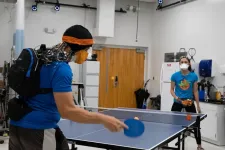(Press-News.org) The American College of Cardiology will host the annual Advancing the Cardiovascular Care of the Oncology Patient course on April 14-16, 2023, in Washington, DC. The course is intended for all members of the interprofessional care team—including cardiologists, oncologists, pharmacists and nurses—and aims to equip the global cardio-oncology community with the tools they need to improve patient care.
Ana Barac, MD, PhD, FACC, and Bonnie Ky, MD, MSCE, FACC, will serve as co-directors for the course, which will be available both in-person and online. The course will bring together clinicians and researchers from across the globe to share emerging strategies and best practices for managing the cardiovascular health of cancer patients.
“I am proud to say that the ACC course has set the standards for cardio-oncology education, including joint presentations of oncologists and cardiologists modeling real-life patient care and collaboration across CV and oncology teams,” Barac said. “This year, our theme is collaboration and innovation through science and for our patients. I am very excited about the first-ever joint sessions with the American Society of Clinical Oncology and the American Society of Hematology that are a testament of the commitment of our professional societies to collaborate and address the gaps that exist across specialties.”
Can’t Miss Sessions:
Pharmacology Essentials for Cardio-Oncology Practice
How to Build and Grow a Cardio-Oncology Program
The Global Burden and Significance of Cancer and Cardiovascular Disease
Cardiovascular Disparities in Cancer Patients and Survivors: Strategies to Implement Inclusive, Equitable Care
Physical Activity Interventions in Our Cancer Patients and Survivors: Why, When, and How?
Posters
The following abstract titles are a selection of posters being presented during the conference. All ACC Advancing the Cardiovascular Care of the Oncology Patients posters and abstracts are embargoed until Friday, April 14, 2023, at 9 a.m. ET.
Racial Disparities in Cardiotoxicity Following Cancer Treatment: A Systematic Review and Meta-Analysis
Assessment of Detectable Atherosclerosis on Computed Tomography Imaging in Breast Cancer Patients Entering Treatment
Prevalence of Statin Use and Dyslipidemia Screening for Secondary Cardiovascular Prevention in Patients with Cancer
SGLT2 Inhibitors are Associated with a Lower Risk of Malnutrition and Cachexia in Patients with Heart Failure Receiving Anthracycline Treatment
If members of the media would like to receive embargoed copies of these abstracts or register for media access to the conference, contact ACC Associate Director for Media Relations Katie Glenn at kglenn@acc.org.
Content from Advancing the Cardiovascular Care of the Oncology Patient will become available on ACC Anywhere one week after the conclusion of the course. ACC Anywhere is the all-new, comprehensive library of ACC’s live and virtual education content. For media access, please reach out to ACC media staff.
The American College of Cardiology (ACC) is the global leader in transforming cardiovascular care and improving heart health for all. As the preeminent source of professional medical education for the entire cardiovascular care team since 1949, ACC credentials cardiovascular professionals in over 140 countries who meet stringent qualifications and leads in the formation of health policy, standards and guidelines. Through its world-renowned family of JACC Journals, NCDR registries, ACC Accreditation Services, global network of Member Sections, CardioSmart patient resources and more, the College is committed to ensuring a world where science, knowledge and innovation optimize patient care and outcomes. Learn more at www.ACC.org or follow @ACCinTouch.
###
END
PHILADELPHIA—Brain development does not occur uniformly across the brain, but follows a newly identified developmental sequence, according to a new Penn Medicine study. Brain regions that support cognitive, social, and emotional functions appear to remain malleable—or capable of changing, adapting, and remodeling—longer than other brain regions, rendering youth sensitive to socioeconomic environments through adolescence. The findings were published recently in Nature Neuroscience.
Researchers charted how developmental processes unfold across the human brain from the ages of 8 to 23 years old ...
The story of how ancient wolves came to claim a place near the campfire as humanity’s best friend is a familiar tale (even if scientists are still working out some of the specifics). In order to be domesticated, a wild animal must be tamable — capable of living in close proximity to people without exhibiting dangerous aggression or debilitating fear. Taming was the necessary first step in animal domestication, and it is widely known that some animals are easier to tame than others.
But did humans also favor certain wild plants for domestication because they were more easily “tamed”? Research from Washington University in St. ...
Captain of her high school tennis team and a four-year veteran of varsity tennis in college, Amanda Studnicki had been training for this moment for years.
All she had to do now was think small. Like ping pong small.
For weeks, Studnicki, a graduate student at the University of Florida, served and rallied against dozens of players on a table tennis court. Her opponents sported a science-fiction visage, a cap of electrodes streaming off their heads into a backpack as they played against either Studnicki or a ball-serving machine. That cyborg look was vital ...
You’d be hard pressed to find an industry today that doesn’t use data in some capacity. Whether it's health care workers using data to report the rate of flu infections in a certain state, manufacturers using data to better understand average production times, or even a small coffee shop owner flipping through sales data to learn about the previous month’s bestselling latte, data can reveal patterns and offer insights into our everyday behavior.
All of this data plays a critical role in artificial intelligence ...
NEW YORK, NY (April 10, 2023)--Columbia researchers have found that babies born to moms who had mild or asymptomatic COVID during pregnancy are normal, based on results from a comprehensive assessment of brain development.
The findings expand on a smaller study that used maternal reports to assess the development of babies born in New York City during the first wave of the pandemic. That study found no differences in brain development between babies who were exposed to COVID in utero and those who were not exposed.
For the new study, the researchers developed a method of observing infants remotely, ...
DURHAM, N.C. –- Most kids know it’s wrong to yell or hit someone, even if they don’t always keep their hands to themselves. But what about if that someone’s name is Alexa?
A new study from Duke developmental psychologists asked kids just that, as well as how smart and sensitive they thought the smart speaker Alexa was compared to its floor-dwelling cousin Roomba, an autonomous vacuum.
Four- to eleven-year-olds judged Alexa to have more human-like thoughts and emotions than Roomba. But despite the perceived difference in intelligence, kids felt neither the Roomba nor the Alexa deserve to be yelled at or harmed. That feeling dwindled as kids advanced ...
Jane Hooper, Associate Professor, History, received funding for the project: "Global Passages: Creating a Public Database of Slaving Voyages across the Indian Ocean and Asia."
Hooper, along with three other scholars, has received a three-year digital production grant from the National Endowment for the Humanities to support a major expansion of the open access SlaveVoyages website, available online at https://www.slavevoyages.org. The primary investigators will create an Indian Ocean and Asia (IOA) database of voyages that ...
CRISPR-Cas9 is widely used to edit the genome by studying genes of interest and modifying disease-associated genes. However, this process is associated with side effects including unwanted mutations and toxicity. Therefore, a new technology that reduces these side effects is needed to improve its usefulness in industry and medicine. Now, researchers at Kyushu University in southern Japan and Nagoya University School of Medicine in central Japan have developed an optimized genome-editing method that vastly reduces mutations, opening the door to more effective treatment of genetic diseases with fewer unwanted mutations. Their findings were published in Nature Biomedical Engineering.
Genome-editing ...
PITTSBURGH, April 10, 2023 – Black and Hispanic older adults whose annual income is slightly above the federal poverty level are more likely than their white peers to face cost-related barriers to accessing health care and filling medications for chronic conditions, according to new research led by a University of Pittsburgh School of Public Health scientist.
Published today in JAMA Internal Medicine, the analysis links these disparities to a Medicaid “cliff” – an abrupt end ...
A recently developed amino acid compound successfully treats nonalcoholic fatty liver disease in non-human primates — bringing scientists one step closer to the first human treatment for the condition that is rapidly increasing around the world, a study suggests.
Researchers at Michigan Medicine developed DT-109, a glycine-based tripeptide, to treat the severe form of fatty liver disease called nonalcoholic steatohepatitis. More commonly known as NASH, the disease causes scarring and inflammation in the liver and is estimated to affect up to 6.5% of the global population.
Results ...




